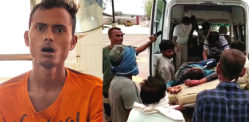Close contact can transmit Mpox
On August 16, 2024, Pakistan said it had confirmed at least one Mpox case, though it does not yet know the strain of the virus.
The Mpox case in Pakistan comes as fears rise of the infection spreading globally.
The 34-year-old patient was treated in Pakistan’s Northwest province of Khyber Pakhtunkhwa.
Reuters reported: “A health officer in Khyber Pakhtunkhwa’s Mardan district said the location of the confirmed Mpox patient, a man the officer said had recently returned from Saudi Arabia, was unknown.”
Officials at the Pakistani Federal Health Ministry said the man belonged to the city of Dir and resides in Mardan.
Health Ministry spokesperson Sajid Shah said that authorities have not confirmed the new variant thus far. Genetic sequencing of the sample from the confirmed patient is underway.
Shah said: “Once that’s done, we will be able to say what strain is this.”
Pakistan’s Health Ministry has directed officials at border crossings and airports to ensure strict surveillance and to collect samples for medical tests if they see symptoms of the disease in any passenger returning from abroad.
The report of a Mpox case in Pakistan comes a day after Sweden confirmed a Mpox case.
The strain found in Sweden is a more easily spread and deadlier variant linked to a recent outbreak in the African subcontinent.
The variant found in Sweden has triggered global concern because it seems to spread more easily through routine close contact.
The World Health Organisation (WHO) declared the outbreak of Mpox in parts of Africa a public health emergency of international concern on August 14.
Breaking News :World Health Organisation declares emergency due to monkey pox .It has currently spread in 13 African countries with over 12000 cases .pic.twitter.com/cIhQaleJRp
— Farzan Ali Baloch (@farzan_ali_b99) August 14, 2024
After the discovery of the case in Sweden, the WHO stressed “the interconnectedness of our world” and further imported cases of the new strain in Europe were likely.
The WHO has advised against any travel restrictions and border closures to stop the spread of Mpox, as they “don’t work and should be avoided”.
There have been 27,000 cases and more than 1,100 deaths, mainly among children, in the Democratic Republic of the Congo (DRC). These cases and deaths have been since January 2023.
The disease has spread to areas of Central and East Africa.
Close contact can transmit Mpox, previously known as monkeypox.
It can also be transmitted through sexual contact, skin-to-skin contact and talking or breathing close to another person.
Mpox causes flu-like symptoms and skin lesions and can be fatal, with four in 100 cases leading to death.
There are two strains of Mpox – Clade 1 and Clade 2.
In 2022, Clade 2 caused a public health emergency but was deemed relatively mild. Clade 1 has a high fatality rate, and a mutant strain of it, called Clade 1b, has spread rapidly.
At least 450 people have died following an outbreak of Mpox Clade 1 in the Congo in 2024 thus far.
Clade 2 is far less dangerous, with a case fatality rate of approximately 0.1%. In other words, roughly one person in a thousand dies.
Scientists are now seeing thousands of cases of Clade 1 being reported in 16 countries in Africa.
The case fatality rate is from three per cent to four per cent, which means three or four people in a hundred die. Many cases are children.
The European Centre for Disease Prevention and Control (ECDC) on August 16, raised its risk level for Mpox from “low” to “moderate”. The ECDC warned there would be more imported cases.
France put its public health system on “maximum alert level” amid concerns over the virus.
The UK Health Security Agency (UKHSA) said there were no cases of the virus in the UK.
Dr Meera Chand, UKHSA Deputy Director, stated:
“The risk to the UK population is currently considered low. However, planning is underway to prepare for any cases that we might see in the UK.
“This includes ensuring that clinicians are aware and able to recognise cases promptly, that rapid testing is available, and that protocols are developed for the safe clinical care of people who have the infection and the prevention of onward transmission.”





























































